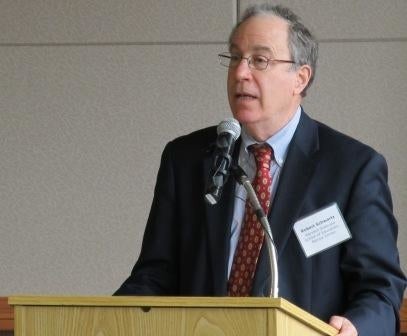The United States is going to face a national economic crisis if it does not better train young people for jobs of the future, according to a recent study from Harvard University that was the focus of a panel discussion this morning at Worcester Technical High School.
For roughly half of young people, that training will likely not include a four-year college, said William Symonds, a former Businessweek education reporter who authored “Pathways to Prosperity,” a Harvard Graduate School of Education report published in February that calls for stronger investment in technical and vocational education.
It is that type of training that will prepare young people for so-called STEM jobs in science, technology, engineering and mathematics, the authors said.
The event also included speakers Robert Schwartz, academic dean at the Harvard Graduate School of Education, Lt. Gov. Timothy Murray and others, who all praised Worcester Technical High School as a model for the country because of its higher than average graduation rates and test scores as well as its low dropout.
The problem, speakers said, is there aren’t enough of schools like Worcester Tech to train young people for jobs that will be available in the near and distant future.
A Multi-Tiered Approach
Schwartz, the Harvard dean and one of the leaders of the Pathways to Prosperity project, said that the United States needs a strategy for the millions of young people who do not pursue education after high school.
“We’re the only developed country that relies so exclusively on one set of institutions,” he said.
Schwartz, who has studied programs in Northern Europe that combine academics and workplace training, said those countries feel a “broader responsibility” to the next generation to help them transition from youth to adulthood.
“These are mainstream systems with a high degree of employer involvement,” he said.
It’s not that higher education will not be important over the next 10 to 20 years. Schwartz said that he would like to see the country increase the four-year college completion rate from 30 percent to 40 percent.
But the real opportunity for growth, he said, lies in technical and vocational schools.
Schwartz said that the United States should seek to double the output of people receiving certificates and degrees from such schools over the next decade, from 20 to 40 percent.
Michael Fitzpatrick, superintendent of Blackstone Valley Regional Vocational Technical High School, said that Massachusetts should commit to building 10 new vocational schools over the next decade and that it could be funded through a 5-cent increase to tolls on the Massachusetts Turnpike and through a state sales tax on Internet sales.

